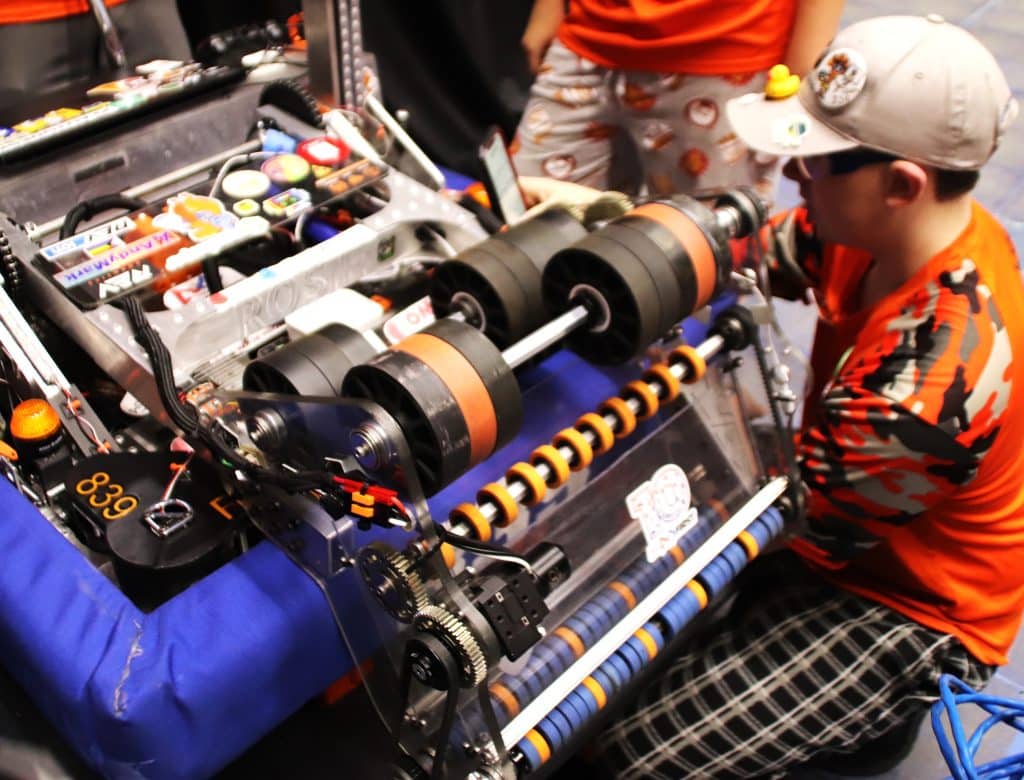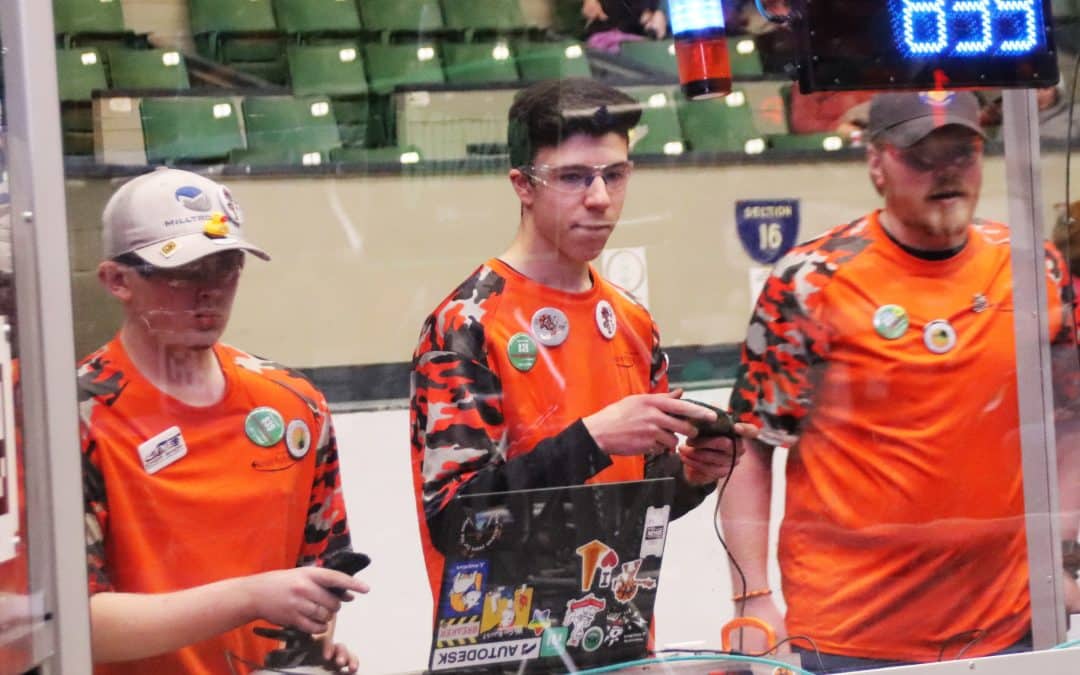Rosie Robotics team members, from left, Matthew Edwards, Tim Rua and Bobby Taylor, a Rosie alum and a team mentor, maneuver their robot during a match at the New England FIRST championship at the Eastern States Exposition in early April.
Reminder Publishing photo by Mike Lydick
AGAWAM — For the first time in nearly a decade, the high school’s Rosie Robotics team recently competed at the FIRST Robotics Competition’s New England regional district championship.
The Agawam High School team was among 96 teams from the six New England states that competed in early April at the Eastern States Exposition. It was an important milestone for the team, even though Agawam didn’t score enough points to advance to the world championship event.
“We set our goal for this year of just getting to the district championship,” said Tim Rua, a sophomore and lead CAD designer for the team. “Not only did we do that, but we performed pretty well at the district championship. So, we not only met our goal, we surpassed it. Next year, our goal is to compete at the world championships.”

Reminder Publishing photo by Mike Lydick
Rua is part of a core group of sophomores who joined the team three years ago as eighth graders and helped to rebuild the team following the coronavirus pandemic.
“We call it the Rosie Reboot,” he said. “The team had pretty much gone dark during the pandemic, and then nearly all the team graduated. We were on the junior high robotics team, so we got pulled up to help rebuild Rosie.”
He and three of his classmates and teammates, Tyler Saroglou, Matthew Edwards and Lucas Fillion, reflected on what the team accomplished this season to make it to the New England competition.
Saroglou, the electrical system lead, said the team has gotten exponentially better every year by learning something crucial to making a good robot.
“Our first year, we winged the process of building a robot. With lessons we learned from year one, we tried to make a really complex robot our second year. It didn’t go so well. We learned a valuable lesson: don’t make it overly complex.”
For this season, Saroglou said the team finally found a balance between the two. “We finally found our sweet spot.”
Edwards, the manufacturing lead, said this was the team’s most successful season so far for this group.
“We accomplished our goal and learned way more than we thought we would. We learned much more because we started to pay attention to the fine details of a lot of things.”
One “big thing,” this season, Edwards said, was getting the robot ready two to three weeks before competition started. “That really helped us to fine tune everything and make our robot faster while allowing for more driver practice.”
Edwards said because the team hadn’t had a consecutive year with the same drive base the robot became faster and faster each year.
“That makes it more even more important to have driver practice. If you start speeding up and speeding up and you don’t have driver practice to handle that, you end up breaking the robot more and more until you learn how to control it.”
Fillion, a member of the design team, said this season was a “huge” success.
“We had looked at a lot of other teams that were successful in the past two years. One of the ideas we added this year was four-wheel drive — which was a big deal and a big success,”
The team also became better at time management, Fillion said: “We were super quick with the design this year — we had a bunch of design ideas already in our heads from looking at other robots. Designing didn’t take nearly as long as last year or the year before. That gave us more time to fine tune things and fix things right away, before we got too far along in the process.”
At the end of the season, Rosie Robotics has some pretty impressive statistics that shows the impact of the rebuilding effort. The team now ranks 62nd out of 182 teams in New England, 29th out of 69 teams in Massachusetts, 838th out of 2,806 teams in the United States and 978th out of 3,474 teams worldwide — the top third in the world for FRC teams.
Dana Henry, who co-founded the high school robotics team in 2001, said the team plans to do more corporate fundraising next season to help cover some of its expenses.
“We need to reach out to see what area companies are interested in helping us out, since we’re training kids who will their future workforce,” Henry said.
Henry said during the next two years the current team also needs to start training the youngest students moving up to join the team: “That way we can continue on after these guys graduate.” He’s also looking to recruit to more Rosie alums as mentors in addition to the three who already work with the team.
Wendy Rua — Tim’s mother and a team mentor — said team spirit, commitment, dedication, positivity and enthusiasm “propelled them to great heights this season.” She said the team networked with other teams, forged friendships and advocated for their strengths and to be recognized at the competitions.
“There was no disappointment, only positive attitudes and validation for a job well done this season,” said Rua. “They made a deliberate effort to become more student-directed and organized themselves similar to a business model, with team leads, a weekly reporting structure, and regular check-ins with coaches and mentors.”
Rua has coached many kids on the team since they began working with robots in elementary school.
“I couldn’t be prouder of each and every one of them. I can’t wait to see where they go in the next year or two,” she said.


